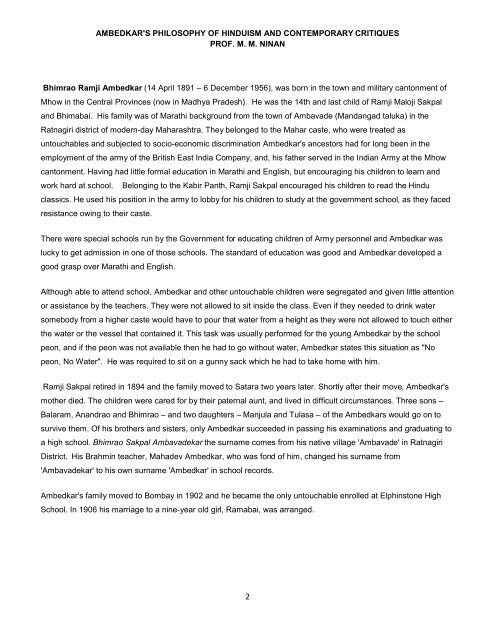Ambedkar-Philosophy of Hinduism
Create successful ePaper yourself
Turn your PDF publications into a flip-book with our unique Google optimized e-Paper software.
AMBEDKAR'S PHILOSOPHY OF HINDUISM AND CONTEMPORARY CRITIQUES<br />
PROF. M. M. NINAN<br />
Bhimrao Ramji <strong>Ambedkar</strong> (14 April 1891 – 6 December 1956), was born in the town and military cantonment <strong>of</strong><br />
Mhow in the Central Provinces (now in Madhya Pradesh). He was the 14th and last child <strong>of</strong> Ramji Maloji Sakpal<br />
and Bhimabai. His family was <strong>of</strong> Marathi background from the town <strong>of</strong> Ambavade (Mandangad taluka) in the<br />
Ratnagiri district <strong>of</strong> modern-day Maharashtra. They belonged to the Mahar caste, who were treated as<br />
untouchables and subjected to socio-economic discrimination <strong>Ambedkar</strong>'s ancestors had for long been in the<br />
employment <strong>of</strong> the army <strong>of</strong> the British East India Company, and, his father served in the Indian Army at the Mhow<br />
cantonment. Having had little formal education in Marathi and English, but encouraging his children to learn and<br />
work hard at school. Belonging to the Kabir Panth, Ramji Sakpal encouraged his children to read the Hindu<br />
classics. He used his position in the army to lobby for his children to study at the government school, as they faced<br />
resistance owing to their caste.<br />
There were special schools run by the Government for educating children <strong>of</strong> Army personnel and <strong>Ambedkar</strong> was<br />
lucky to get admission in one <strong>of</strong> those schools. The standard <strong>of</strong> education was good and <strong>Ambedkar</strong> developed a<br />
good grasp over Marathi and English.<br />
Although able to attend school, <strong>Ambedkar</strong> and other untouchable children were segregated and given little attention<br />
or assistance by the teachers. They were not allowed to sit inside the class. Even if they needed to drink water<br />
somebody from a higher caste would have to pour that water from a height as they were not allowed to touch either<br />
the water or the vessel that contained it. This task was usually performed for the young <strong>Ambedkar</strong> by the school<br />
peon, and if the peon was not available then he had to go without water, <strong>Ambedkar</strong> states this situation as "No<br />
peon, No Water". He was required to sit on a gunny sack which he had to take home with him.<br />
Ramji Sakpal retired in 1894 and the family moved to Satara two years later. Shortly after their move, <strong>Ambedkar</strong>'s<br />
mother died. The children were cared for by their paternal aunt, and lived in difficult circumstances. Three sons –<br />
Balaram, Anandrao and Bhimrao – and two daughters – Manjula and Tulasa – <strong>of</strong> the <strong>Ambedkar</strong>s would go on to<br />
survive them. Of his brothers and sisters, only <strong>Ambedkar</strong> succeeded in passing his examinations and graduating to<br />
a high school. Bhimrao Sakpal Ambavadekar the surname comes from his native village 'Ambavade' in Ratnagiri<br />
District. His Brahmin teacher, Mahadev <strong>Ambedkar</strong>, who was fond <strong>of</strong> him, changed his surname from<br />
'Ambavadekar' to his own surname '<strong>Ambedkar</strong>' in school records.<br />
<strong>Ambedkar</strong>'s family moved to Bombay in 1902 and he became the only untouchable enrolled at Elphinstone High<br />
School. In 1906 his marriage to a nine-year old girl, Ramabai, was arranged.<br />
2


















